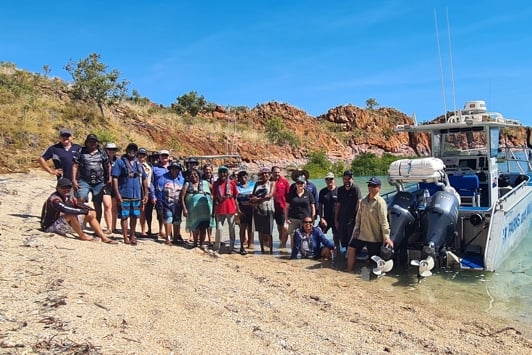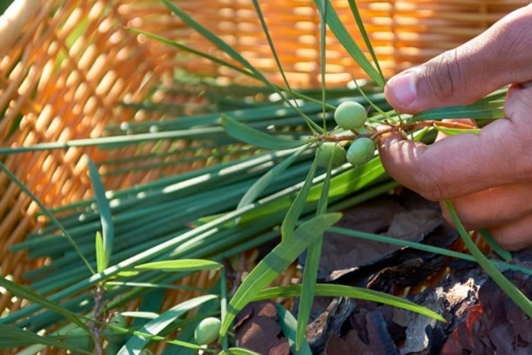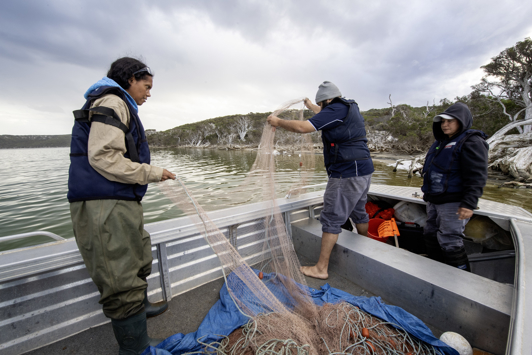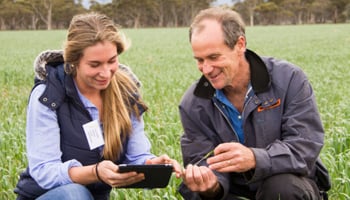DPIRD's Aboriginal economic development (AED) program delivers models of support and targeted programs that empower Aboriginal people to develop and sustain long-term outcomes that strengthen communities.
Projects are informed by and delivered in partnership with Aboriginal people, businesses and other entities. Partnership is the key to lasting project outcomes, and empowering Aboriginal people to choose their own futures from a secure foundation.
The AED program is designed and delivered through a well thought out strategic approach.
All projects are aimed at growing Aboriginal business, increasing Aboriginal employment, and facilitating opportunities for wealth creation and economic empowerment. They are aligned with a strategic approach developed by DPIRD to unlock and activate opportunity areas through diverse and tailored delivery methods.
Support may be delivered through DPIRD's AED team, or the team might facilitate and coordinate support through Regional Development Commissions and external service providers, or through negotiated partnerships. Aboriginal owned and operated service providers are engaged wherever possible.
Strategies
- Tailored case management support for Aboriginal pastoral, farming and fisheries enterprises.
- Unlocking opportunities and developing resources to increase Aboriginal participation in emerging land and sea-based primary industries.
- Engaging service providers to deliver business planning, governance and leadership support for Aboriginal people looking to create new businesses, grow and diversify.
- Supporting the economic aspirations of Aboriginal entities (including Prescribed Bodies Corporate) involved in Native Title negotiations and divestments through economic mapping, strategic planning and project development.
- Facilitating procurement support for Aboriginal entities interested in government tenders and the (buy close to home).
- Working in partnership with industry to create training to employment pathways which support careers and grow an Aboriginal workforce for primary industries and the regions.
- Supporting DPIRD's commitments to the whole-of-government approach and initiatives to improve socioeconomic outcomes for Aboriginal people in WA
Opportunity areas
The AED program is focused on opportunities for Aboriginal economic participation within WA’s primary industries and regions, and through whole-of-government initiatives.
The AED program of work is built around economic opportunity areas such as:
- growing Aboriginal business
- increasing Aboriginal employment
- unlocking land and sea potential
- optimising the Aboriginal pastoral estate
- Native Title
- land divestment to Aboriginal ownership.
Delivering our projects
AED officers are located across the state and play different roles because every AED project is bespoke, flexible and unique.
AED officers may have a direct role in project delivery, involving engagement and collaboration with Aboriginal people. They may also coordinate, facilitate and refer project delivery through industry peak bodies or Regional Development Commissions and external service providers. They may broker partnerships through advocacy and leveraging.
The role of AED officers can be influenced by many different factors, such as how Aboriginal people and entities want to be involved, their capacity and the involvement of other organisations.
Irrespective of their role, AED officers will always prioritise spending time with Aboriginal people and their communities, getting to know each other and developing trust. Strong relationships enable AED officers to bring to life the aspirations of Aboriginal people by identifying appropriate economic development opportunities, and putting in place the capacity building supports and partnerships needed to realise these opportunities.
Capacity building
The AED program unlocks, activates and accelerates opportunities that can lead to increased Aboriginal economic participation. Capacity building enables Aboriginal people to transform these opportunities into stable and self-sustaining entities and careers.
Capacity is built through a broad suite of tailored supports, such as training, coaching, work experience, grants and resources. AED’s focus is on:
- corporate governance and leadership skills
- tendering for procurement contracts
- business scoping and planning
- transitioning into new or alternative business models
- entering new industries
- industry-specific skills
- job-readiness.
These services are delivered through the department's partnership initiatives that aim to improve governance and leadership, success in procurement, career development and the profitability of Aboriginal pastoral and farming properties.
The delivery mechanism for capacity building supports will vary, because every AED project is bespoke based on what Aboriginal people want, their needs and their location. Support can be delivered through DPIRD's AED team, Regional Development Commissions, external service providers or formal partnership arrangements.
Centring people, place and culture
Effective AED projects are based on the aspirations of Aboriginal people, their place and their culture. Effective projects account for the enormous variances between WA's regions and remote communities, and the uniqueness of the culture, knowledge and expertise of Aboriginal people.
People
Where possible, AED staff and Aboriginal communities work together on project design and delivery to ensure they are aligned with their needs and aspirations. Participation will vary, depending on existing relationships between staff and Aboriginal people, how the community wants to be involved, and required collaboration and partnerships. Aboriginal people may have knowledge, expertise and lived experience that can enhance project design and delivery.
Place
Project design takes into consideration the unique opportunities and challenges of each region and remote area. There are variances related to geography, existing services, infrastructure and potential partners. These differences will influence accessibility and service delivery.
Culture
AED projects are led by the department's Aboriginal employees and other culturally capable AED officers who know how to make projects accessible, trusted and safe for Aboriginal people. Communities will not engage in projects if services and activities are not consistent with their cultural protocols and customs and suited to their learning styles and ways of working.
Apply for AED initiatives, programs and grants
AED projects and initiatives are focused on the long term, to facilitate a flourishing and self-sustaining Aboriginal business sector, career pathways for Aboriginal people, and lasting economic empowerment. This is the key to sustainable and lasting improvements to Aboriginal economic outcomes in WA.
The Aboriginal Governance and Leadership Development Program (AGLDP) provides Aboriginal people access to grants and services aimed at building capacity in business, corporate governance, business leadership and procurement.
Support delivered through the five streams of the AGLDP is tailored to the aspirations and development needs of Aboriginal people and entities. The five streams are detailed below.
1. Aboriginal Procurement Advisory Service
The Aboriginal Procurement Advisory Service stream was established by the department to help Aboriginal businesses find and successfully tender for WA Government procurement contracts. Its goal is to increase the pool of procurement-ready Aboriginal businesses in regional areas that can meet local demand.
Aboriginal owned and operated service provider Morrgul has been engaged to deliver the Aboriginal Procurement Advisory Service initiative, which is available at no cost to Aboriginal businesses across WA. Morrgul provides services such as:
- matching businesses with government procurement opportunities
- assisting with tender applications
- supporting Aboriginal businesses through the procurement process
- help to form joint venture partnerships.
Morrgul has been significantly successful in supporting existing Aboriginal businesses and prospective new businesses to win tenders. The foundation to this success has been a focus on building capacity in governance and management, and ensuring that support is tailored to the aspirations and development needs of Aboriginal business owners and operators, and aligned with their culture and traditions.
2. Building Better Aboriginal Businesses grants
The Building Better Aboriginal Business (BBAB) stream is a key element of the broader AGLDP.
BBAB aims to assist in building corporate governance and business management capacity within Aboriginal corporations in regional and remote locations in Western Australia to grow an opportunities pipeline aligned to regional business development opportunities.
Aboriginal entities in regional and remote locations can apply for BBAB grants to build capacity in business governance so they can pursue new business opportunities.
Funding is delivered via a targeted competitive grants program. Aboriginal people and entities can apply for grants to fund corporate and business governance training, and targeted industry skills development.
3. Aboriginal Business Leadership Initiative
The Aboriginal Business Leadership Initiative (ABLI) stream has been delivered in six regions across WA including the Gascoyne, Goldfields-Esperance, Great Southern, Mid-West, South West, and Wheatbelt, reaching a total of 72 participants. The program has been running since 2018.
The ABLI program is delivered annually and targets regional Aboriginal leaders to grow and develop business and leadership skills within their regional communities. The ABLI program provides personal development, mentoring, knowledge and business skills development.
4. Jawun Program
The Jawun Program places skilled people from WA’s leading companies and government agencies into Aboriginal organisations. These secondees share their expertise and support Aboriginal corporations and leaders to achieve their own development goals.
5. Business Capability Partnership Fund
The aim of the Business Capability Partnership Fund is to facilitate bespoke regional development opportunities in partnership with Aboriginal business, industry and other sector wide initiatives, which promote Aboriginal business development and broader economic participation.
This enables DPIRD to identify and support Aboriginal economic participation in new and emerging industries, bespoke regional opportunities and activities to be delivered under the WA Regional Development Framework that encourage and promote Aboriginal empowerment and prosperity.
It supports priorities that:
- promote economic participation and job creation for Aboriginal businesses and people
- support delivery of initiatives aligned with the National Framework on Closing the Gap and its priority reform areas
- promote economic participation in primary industries and broader regional development priorities.
The Aboriginal Pastoral Program is comprised of business and governance support offered by the department, and 3 targeted streams of support for Aboriginal held pastoral properties.
The Aboriginal Pastoral Program is aimed at meeting the economic development needs of a new generation of Aboriginal pastoral enterprises, while still supporting the old. Since the 1990s, we have been supporting long-term economic development pathways that can meet the generational goals of Aboriginal people. This includes the need to grow self-managed and profitable pastoral enterprises that can be passed on to the next generation.
Background
Aboriginal pastoral enterprises represent 31% of the entire pastoral estate in Western Australia, meaning that there is enormous potential to create a pathway to economic empowerment and self-determination through a thriving Aboriginal pastoral sector.
Since 1996, DPIRD initiatives, such as the Kimberley Indigenous Management Support Project and the Indigenous Land Service, were pioneers of an approach that was decades ahead of the vision and intent of Closing the Gap. This was evidenced by a number of public sector and economic development awards during the 2000s, most notably Premier's and Prime Minister's awards for excellence. This approach, which became the backbone of DPIRD’s Aboriginal Economic Development program including the Aboriginal Pastoral Program initiative, ensures that support is:
- driven by the goals of Aboriginal people
- delivered through a collaborative partnership that is led by Aboriginal pastoral corporation boards
- designed to maintain the integrity of culture, traditions and lifestyles
- focused on generational goals
- whole-of-enterprise and whole-of-community capacity building, to enable successive generations to expand on the vision of their elders and improve their way of life.
Foundation for business governance
Governance support is the foundation of DPIRD’s pastoral support initiatives, and the starting point for pastoral enterprise development. Improved governance is the key to productivity, profitability and growth, and leads to better planning and financial management. Improved governance can also lead to better decision-making in relation to profitability factors such as:
- herd capacity
- infrastructure
- financing
- whether to adopt alternative business models.
DPIRD’s Aboriginal Economic Development officers work with Aboriginal pastoral corporation boards and station managers to ensure that supports are tailored to their development needs. This may require the engagement of professional, legal, accounting or other specialist service providers.
Setting up for success
The setting up for success initiative supports Aboriginal pastoral enterprises to review and transition to new business models, such as agistment, subleases and grazing licences. New models can lead to commercial investment and provide an opportunity for pastoral corporations to step away from self-management and increase income generation and investment in their properties.
For some pastoral enterprises, alternative business models can result in:
- improving pastoral property infrastructure such as fencing, herd and waterpoints
- Increasing on Country employment and training opportunities for Aboriginal youth
- reduced animal welfare risks.
We have produced a suite of setting up for success guides and factsheets, specific to growing and emerging land and sea-based primary industries. These include carbon farming, sandalwood, bushfoods, native seeds and alternative pastoral businesses.
Download the suite of setting up for success guides
Aboriginal Pastoral Academy
The Aboriginal Pastoral Academy was established to nurture the next generation of Aboriginal pastoral employees in the WA's northern regions.
The Academy is a partnership between Nyamba Buru Yawuru, Job Pathways. and the Kimberley Pilbara Cattlemen’s Association with support from DPIRD.
The successful initiative has been operating in the West Kimberley since 2021, and since 2024 in the East Kimberley.
The program aims to support around 20 graduates per year who have completed pre-employment pastoral training programs to be employed on Kimberley and Pilbara cattle stations.
Graduates from the entry level program are intensively mentored for their first two years of employment, with their workplaces also receiving a range of support throughout the placement.
The Academy also supports existing Aboriginal pastoralists to build their skills and leadership through delivery of regular leadership, business and pastoral skills training programs.
The Farm Business Resilience program will help farmers identify gaps in their business strategy and provide them with the tools they need to prepare for, and manage, risk and improve farm business resilience.
The Western Australian Government is working with the Australian Government's Future Drought Fund Farm Business Resilience program (FBR).
The Aboriginal primary industries program supports Aboriginal participation, leadership, and ownership across key primary industry sectors covering the following initiatives:
- Aboriginal Pastoral Academy East Kimberley Expansion in partnership with Job Pathways and Kimberley Pilbara Cattlemen's Association.
- Indigenous Aquaculture and Fishing Project in partnership with the Indigenous Saltwater Advisory Group, an Indigenous-led forum in the Kimberley region of Western Australia, representing nine or more Saltwater Prescribed Bodies Corporate to manage and protect sea country.
- First Nations Regenerative Agribusiness Capability Program strengthening business capability, strategic management, and workforce development through tailored support for Aboriginal landholders and land managers across regional WA.
- Aboriginal Bushfoods Business Support Service provides skills development, nurtures enterprise growth, and builds sustainable industry pathways for Aboriginal businesses with support from Western Australian Indigenous Tourism Operators Council.
- Aboriginal Sandalwood Industry Capability Program in partnership with K Farmer Dutjahn Foundation.This program was established in response to the 2020 Sandalwood Taskforce report which outlined 8 key recommendations to strengthen and grow Aboriginal participation in WA's sandalwood sector.
The Aboriginal Bushfood Business Support Service is the first specialist initiative in WA dedicated to growing Aboriginal owned bushfood and botanical businesses.
The Service focuses on building capability, confidence, and long-term sustainability through tailored support and culturally grounded leadership.
It provides support to WA Aboriginal businesses or individuals starting or growing bushfood and botanical businesses, navigating industry-specific challenges, and/or building strong foundations for success.
Areas covered by the Service include:
- protection of Indigenous Cultural Intellectual Property (ICIP)
- access and benefit sharing
- licensing and regulatory pathways
- supply chain development
- business acceleration
- market access – both domestic and export
- business coaching and mentoring.
Programs currently offered as part of the Service:
Foundations of Leadership
Aboriginal Business Leadership Initiative - Kimberley Women’s Collective
A program empowering female-led Aboriginal bush product enterprises in the Kimberley region through:
- supporting culturally significant roles for women in the bushfoods sector
- building viable, community-rooted enterprises
- protecting traditional knowledge and practices
- creating employment and shaping the future of their communities.
Business Incubation
Building Better Aboriginal Business Supply Chain Voucher
This voucher provides support to empower both emerging and expanding Aboriginal businesses across WA working in bushfoods, bush products, seafood and beef industries
The voucher will foster:
- efficient, sustainable practices
- strong governance structures
- business development support across WA
Please contact the Bushfood Business Support team before you apply
Business Acceleration
Bushfood Base
The Aboriginal Bushfood Business Base is a purpose-built hub located within the Sustainable Innovative Food Technologies (SIFT) Centre. It provides Aboriginal farmers, producers, and businesses with access to:
- expert advice and industry mentorship
- state-of-the-art equipment for food processing and product development
- collaborative networks across government, academia, and industry.
Seed to Success: Bushfood Business Development Pilot
A targeted initiative working with established Aboriginal businesses across WA to accelerate the growth and sustainability of their bushfood enterprises. Through intensive personalised support, this pilot program aims to unlock each business’s full potential and position them for long-term success.
Indigenous Cultural Intellectual Property
Providing Aboriginal businesses with a Non-Disclosure Agreement and Material Transfer Agreement templates that have been developed with industry experts Terri Janke & Company.
Related information
-
Guides and factsheets have been developed to support Aboriginal participation in emerging land- and sea-based primary industries, offering practical “how-to” advice on production, harvesting, manufacturing, and selling.View more about Setting up for success guides
-
Food and beverage producers may use this search to shortlist providers of professional services to the food and beverage industry in Western Australia.View more about WA Food and Beverage Professional Service Provider Directory
-
The department recognises customary fishing as an integral part of Western Australia’s (WA) Aboriginal cultures in maintaining connection to country.View more about Customary fishing
-
Information about grants, schemes, disaster recovery funding, and support programs available to assist Western Australians.View more about Grants and support
-
We provide information to help people in the rural areas of Western Australia find the support and assistance they need to deal with stressful situations.View more about Regional finance and counselling support
-
The WA Government provides co-investment to increase capacity and strengthen resilience in mobile connectivity and broadband internet services for regional and remote businesses and communities in WA.View more about Digital connectivity
More information
- DPIRD Reconciliation Action Plan
- Closing the Gap
- Local Content Adviser Network
- Rural Business Development Corporation
- Australian Government farming, food and rural support
- Regional Investment Corporation - Australian Government
- Disaster Recovery Funding Arrangements
- Drought response - Interest-free loans
Contact us
-
Aboriginal Economic Development (AED) team







